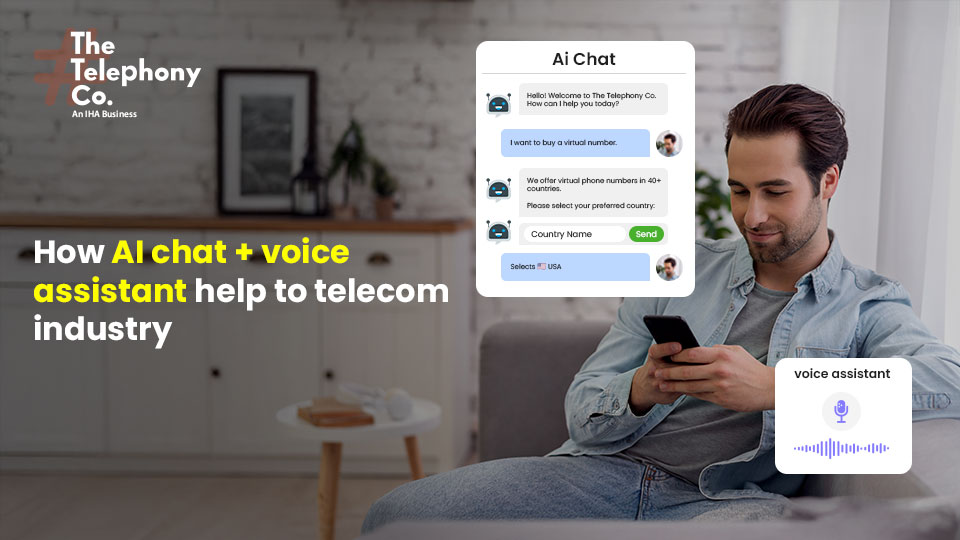The telecom industry is rapidly transforming as artificial intelligence (AI) integrates deeply into its operations. Among the most impactful innovations are AI chatbots and voice assistants, which are redefining how telecom providers manage customer support, streamline operations, and deliver better, faster, and smarter services. When combined with VoIP (Voice over Internet Protocol) technology, AI becomes even more powerful—enhancing everything from virtual call centers to customer onboarding.
In this article, we explore the multifaceted ways AI chat and voice assistants are reshaping the telecom landscape.
Here are Some Key Reasons How AI Chatbots and Voice Assistants are Helping Transform the Telecom Industry
24/7 Customer Support with AI Chatbots
Traditional customer service is often limited by human working hours, long wait times, and inconsistent service. AI-powered chatbots resolve this by providing:
- Instant responses to FAQs, technical issues, and account queries.
- 24/7 availability, improving customer satisfaction and retention.
- Multi-language support that breaks geographical barriers.
- Seamless integration with telecom websites, apps, and VoIP systems.
By deploying AI chatbots across platforms, telecom operators reduce reliance on call center staff while offering always-on support.
Smart Voice Assistants for Natural Conversations
Voice assistants use Natural Language Processing (NLP) to handle customer queries through speech—ideal for users who prefer talking over typing.
- Troubleshooting technical issues
- Service activation
- Plan recommendations
- IVR enhancements (interactive voice response that feels human)
When integrated with VoIP phone systems, voice assistants can manage calls dynamically, reroute calls, or trigger workflows based on the user’s intent—reducing call drop-offs and frustration.
AI-Powered IVR Phone Systems
Traditional IVR phone systems follow a rigid, rule-based script. With AI, IVR becomes dynamic and intelligent.
- Recognizes customer intent using speech-to-text and NLP
- Provides personalized answers based on CRM data
- Automatically routes calls to the right department or agent
- Reduces the time users spend navigating menu options
AI-driven IVR combined with VoIP routing systems creates a powerful, flexible contact center that adapts to user behavior in real-time.
Predictive Maintenance and Network Optimization
AI voice assistants are not limited to customer-facing roles—they also help internal teams.
- Technicians can ask a voice assistant for real-time network status updates
- Chatbots can predict service outages using historical data and usage patterns
- Engineers can be alerted automatically when quality of service drops
This proactivity leads to faster resolutions and reduced downtime, all powered by AI working hand-in-hand with telecom infrastructure.
Automated Lead Generation and Onboarding
AI chatbots integrated into telecom websites or social media can engage potential customers by:
- Asking qualification questions
- Recommending suitable plans for your business need
- Scheduling demo calls for any time
- Guiding users through VoIP number setup or Call activation
Once converted, AI can automate account verification, number activation, and KYC processes—reducing onboarding time from hours to minutes.
Call Summarization and Sentiment Analysis
Modern voice AI tools can listen to live or recorded VoIP calls
- Summarize conversations for agent follow-ups
- Highlight angry or dissatisfied customers
- Track keywords like “cancel,” “problem,” or “bad service”
This helps telecom managers spot customer pain points, retrain agents, or escalate unresolved issues—improving both performance and satisfaction scores.
VoIP Integration: Making Everything Smarter
AI-powered chat and voice solutions deliver peak performance when integrated with VoIP systems, offering:
- Intelligent call routing
- Call transcription and keyword tracking
- Voicemail analysis
- Real-time quality monitoring
- Inbound/outbound automation based on triggers
This turns a regular VoIP setup into a smart, AI-driven communication ecosystem, perfect for modern telecom operations.
Reduced Operational Costs
By automating repetitive tasks (billing queries, demo, plan upgrades, support service), telecom providers:
- Decrease dependence on live agents
- Lower call center infrastructure costs
- Reduce error rates in service delivery
This directly improves profit margins while maintaining high service levels.
Scalable Customer Experience for Growing Networks
As your business expands across regions or countries, maintaining a consistent customer experience becomes difficult. AI chatbots and voice assistants:
- Scale effortlessly without extra manpower
- Maintain consistency in tone, language, and accuracy
- Offer centralized analytics and reporting dashboards
Whether serving 10,000 or 10 million users, AI ensures the customer experience remains smooth and uniform.
Final Thoughts: The AI + VoIP Future of Telecom
The combination of AI chat, voice assistants, and VoIP is not just a trend—it’s the new standard for telecom efficiency, customer satisfaction, and innovation. From smart IVR to predictive analytics and intelligent automation, telecom operators leveraging AI are better positioned to lead in a hyper-competitive market.
As AI models get even more conversational and context-aware, expect voicebots that remember preferences, predict issues before they occur, and even negotiate plans dynamically—all while reducing costs and boosting engagement.
Quick Recap: Benefits of AI Chat + Voice in Telecom
- 24/7 omnichannel support
- Intelligent call handling via VoIP
- Lower operational costs
- Personalized customer journeys
- Faster issue resolution
- Scalable infrastructure
- Improved agent performance
FAQ's
What are AI chatbots and voice assistants in telecom?
AI chatbots are automated systems that handle customer queries via chat interfaces like websites, apps, or messaging platforms. Voice assistants perform similar tasks using voice interaction, allowing users to talk naturally, often through phones, smart devices, or VoIP systems.
They use Natural Language Processing (NLP) and Machine Learning (ML) to understand questions, process requests, and provide human-like responses.
How do AI chatbots benefit telecom customer support?
- Handle common queries 24/7
- Reduce wait times and agent workload
- Support multilingual conversations
- Integrate with CRM and VoIP systems to provide personalized answers
What is the role of AI in VoIP services?
AI enhances VoIP (Voice over Internet Protocol) services by:
- Analyzing live calls in real-time
- Transcribing conversations automatically
- Detecting keywords and sentiment (e.g., angry customers)
- Triggering auto-responses or follow-ups
- Routing calls based on behavior or call history
How does AI improve call routing and IVR systems?
- Understand speech rather than keypad inputs
- Recognize customer intent and skip irrelevant menu options
- Route callers directly to the right agent or department
- Use past interactions to personalize call handling
Which telecom services benefit the most from AI?
- VoIP service providers
- SIP (Session Initiation Protocol Provider)
- Toll-Free Number Provider (The Telephony Co provide in 40+ Countries)
- Call tracking Service provider
- Virtual number providers
- Messaging Service Provider
How can telecom companies integrate AI with existing systems?
Most AI chat and voice assistants come with API integrations for:
- CRM tools (like Zoho, Salesforce)
- VoIP platform
- Billing systems
- SMS/email marketing tools

